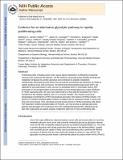Evidence for an Alternative Glycolytic Pathway in Rapidly Proliferating Cells
Author(s)
Vander Heiden, Matthew G.; Locasale, Jason W.; Swanson, Kenneth D.; Sharfi, Hadar; Heffron, Gregory J.; Amador-Noguez, Daniel; Christofk, Heather R.; Wagner, Gerhard; Rabinowitz, Joshua D.; Asara, John M.; Cantley, Lewis C.; ... Show more Show less
DownloadVander Heiden_Evidence for.pdf (818.7Kb)
PUBLISHER_POLICY
Publisher Policy
Article is made available in accordance with the publisher's policy and may be subject to US copyright law. Please refer to the publisher's site for terms of use.
Terms of use
Metadata
Show full item recordAbstract
Proliferating cells, including cancer cells, require altered metabolism to efficiently incorporate nutrients such as glucose into biomass. The M2 isoform of pyruvate kinase (PKM2) promotes the metabolism of glucose by aerobic glycolysis and contributes to anabolic metabolism. Paradoxically, decreased pyruvate kinase enzyme activity accompanies the expression of PKM2 in rapidly dividing cancer cells and tissues. We demonstrate that phosphoenolpyruvate (PEP), the substrate for pyruvate kinase in cells, can act as a phosphate donor in mammalian cells because PEP participates in the phosphorylation of the glycolytic enzyme phosphoglycerate mutase (PGAM1) in PKM2-expressing cells. We used mass spectrometry to show that the phosphate from PEP is transferred to the catalytic histidine (His11) on human PGAM1. This reaction occurred at physiological concentrations of PEP and produced pyruvate in the absence of PKM2 activity. The presence of histidine-phosphorylated PGAM1 correlated with the expression of PKM2 in cancer cell lines and tumor tissues. Thus, decreased pyruvate kinase activity in PKM2-expressing cells allows PEP-dependent histidine phosphorylation of PGAM1 and may provide an alternate glycolytic pathway that decouples adenosine triphosphate production from PEP-mediated phosphotransfer, allowing for the high rate of glycolysis to support the anabolic metabolism observed in many proliferating cells.
Date issued
2010-09Department
Massachusetts Institute of Technology. Department of Biology; Koch Institute for Integrative Cancer Research at MITJournal
Science
Publisher
American Association for the Advancement of Science
Citation
Vander Heiden, Matthew G., Jason W. Locasale, Kenneth D. Swanson, Hadar Sharfi, Greg J. Heffron, Daniel Amador-Noguez, Heather R. Christofk, Gerhard Wagner, Joshua D. Rabinowitz, John M. Asara, and Lewis C. Cantley. "Evidence for an Alternative Glycolytic Pathway in Rapidly Proliferating Cells." Science 17 September 2010: 329 (5998), 1492-1499.
Version: Author's final manuscript
ISSN
0036-8075
1095-9203